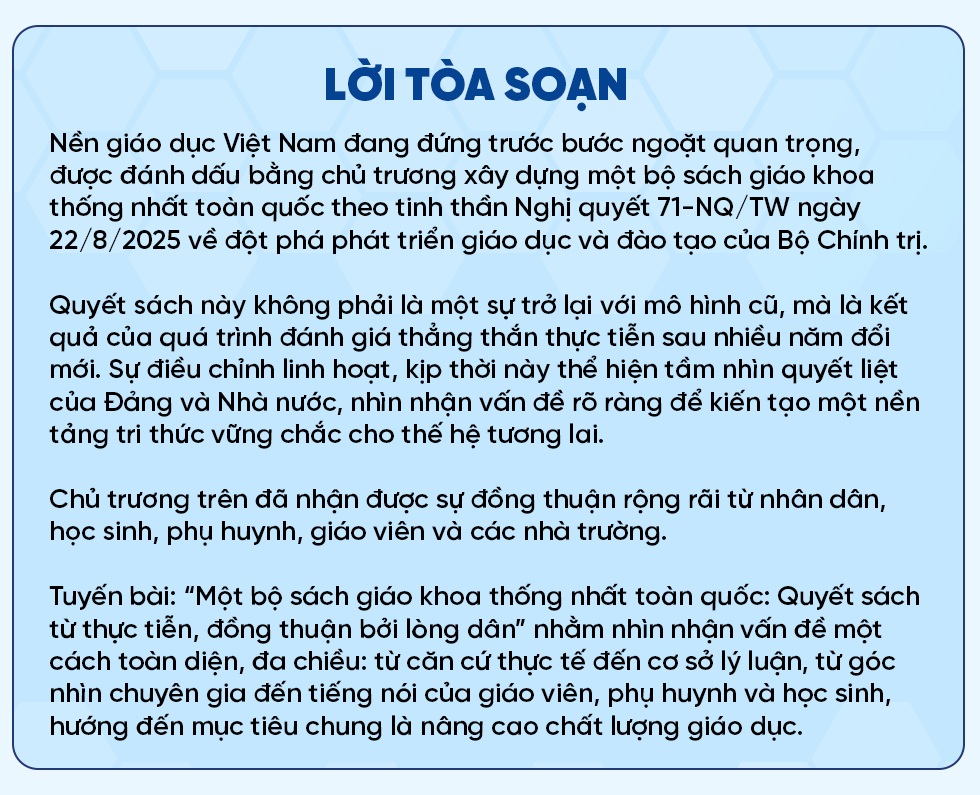
Resolution 71-NQ/TW dated August 22, 2025, of the Politburo on breakthroughs in education and training development continues to emphasize: "In the process of national development, the Party and State of Vietnam have always considered education and training, along with science and technology, as top national priorities."
At the National Conference on the Politburo's Resolutions in September, General Secretary To Lam once again affirmed that investing in education is investing in the future of the nation, nurturing the "national spirit".
One of the groundbreaking policies for education and training outlined in Resolution 71 is to ensure the provision of a unified national set of textbooks, striving to provide free textbooks for all students by 2030.

The 2018 General Education Program was implemented according to a roadmap starting from the 2020-2021 school year, ushering in an era of "one curriculum - multiple textbooks". This was initially expected to end the publishing monopoly and encourage the socialization of textbook compilation.
Three main sets of textbooks, "Connecting Knowledge with Life," "Creative Horizons," and "Kite," are widely circulated and used in schools.
According to Resolution 88/2014 of the National Assembly, in order to proactively implement the new general education program, the Ministry of Education and Training is to organize the compilation of a set of textbooks. This set of textbooks will be evaluated and approved fairly alongside textbooks compiled by organizations and individuals. However, for various reasons, the Ministry of Education and Training has not yet compiled a set of state-issued textbooks.
During the educational and training reforms of recent years, allowing multiple sets of textbooks to coexist has created competition, encouraged creativity, and fostered innovation in teaching methods. However, the practical implementation has also given rise to numerous shortcomings.
Therefore, Resolution 71 requires a review and evaluation of the implementation of the 2018 General Education Program and the provision of a unified national set of textbooks. To achieve this, the Government will develop an action plan for the 2026-2027 school year, during which students will use the unified national set of textbooks.
Professor Pham Tat Dong - former Deputy Head of the Central Committee for Science and Education, former Vice President of the Vietnam Association for the Promotion of Learning, and a participant in the 1979 textbook compilation - believes that unifying a single set of textbooks is necessary.
At the age of 91, he went through his secondary and teacher training years without the concept of textbooks. When he became a teacher, from 1953 to 1956, the school where he taught also did not have textbooks. Teachers only relied on the curriculum to prepare lessons and teach classes.
In 1979, when Vietnam implemented its third educational reform, Professor Pham Tat Dong was one of the members involved in organizing the writing of textbooks. These were textbooks that were used free of charge.
This veteran expert asserted that, after more than four decades of witnessing the history of textbooks, he believes that the Ministry of Education and Training taking charge of managing a single set of textbooks is the most stable and fair approach.
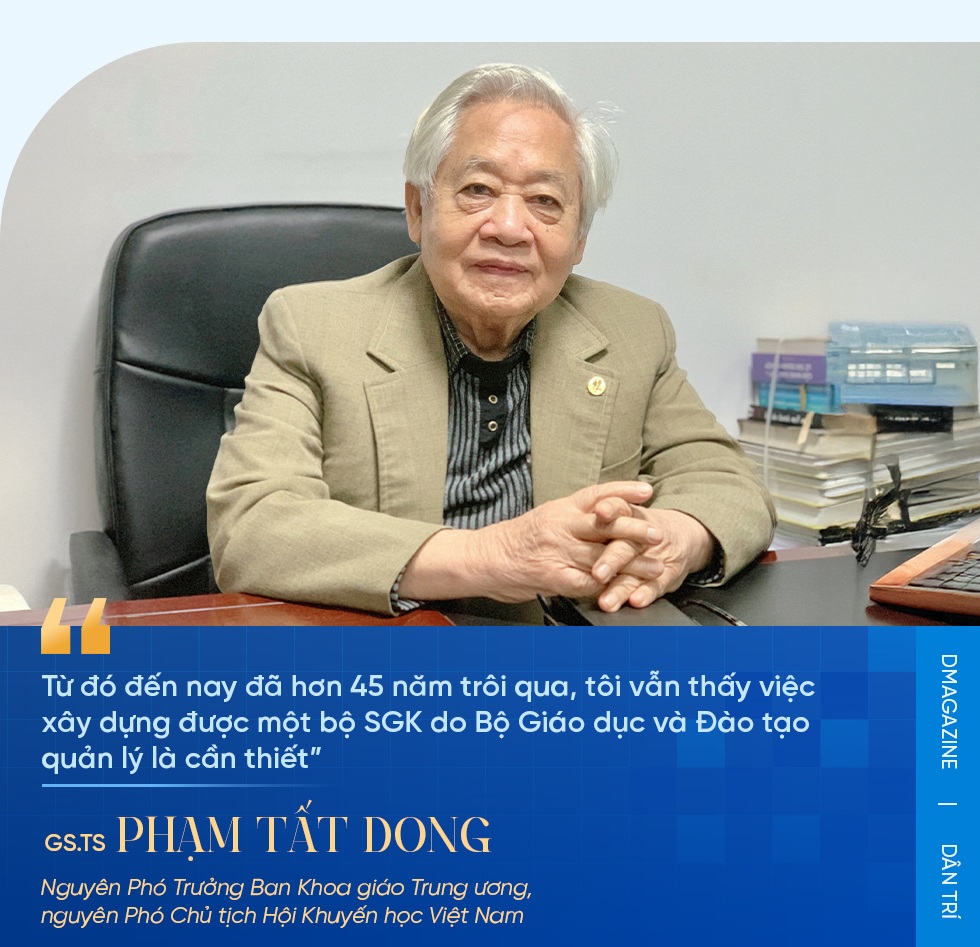
Observing the practical implementation of the "one curriculum - multiple textbooks" model over the past period, Professor Pham Tat Dong noted that there are quite a few shortcomings alongside some advantages.
He pointed out that, in addition to the high cost and waste in printing, the existence of multiple sets of textbooks simultaneously has created confusion in directing their use in each locality. For example, the fierce competition for market share among textbook printing and distribution facilities sometimes leaves the governing ministry unprepared, forcing them to readjust regulations regarding the right to choose textbooks at educational institutions.
According to Mr. Dong, implementing a unified set of textbooks would be very beneficial for administrators, students, and parents alike.
"A good set of textbooks will limit the need to print and publish too many reference books, avoiding waste. At the same time, the textbooks themselves already serve as reference materials when implementing the teaching program. And there are many reference materials for lesson planning available online, in libraries, and digital libraries," he remarked.
Therefore, the former Deputy Head of the Central Committee's Science and Education Department supports the compilation of a unified set of textbooks nationwide to overcome the disparities and lack of uniformity in teaching and learning between localities, ensuring that students learn using learning materials of the same quality.
In addition, Mr. Dong also highly appreciated the initiative to provide free textbooks to all students, which contributes to laying the foundation for an education system as President Ho Chi Minh envisioned from the early days of the establishment of the Provisional Revolutionary Government of the Democratic Republic of Vietnam.
Mr. Dong believes that with the development of technology, providing free textbooks in the future is entirely feasible, with the emergence of electronic textbooks, smart textbooks integrating AI and big data… along with models of “smart schools”, “digital schools”, and “happy schools”.
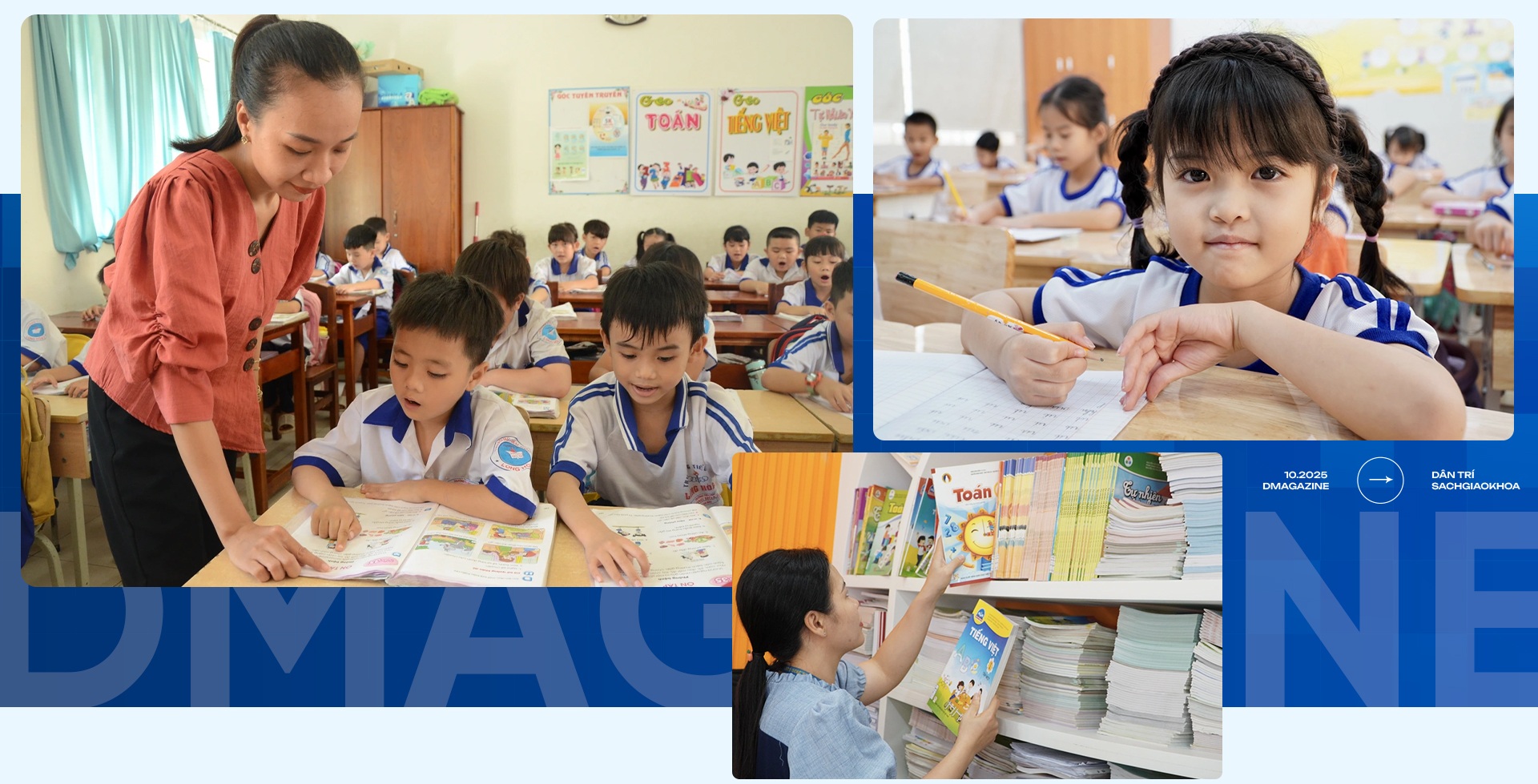
Sharing the same view, Professor Phan Van Tan, PhD, from the Faculty of Natural Sciences, Vietnam National University, Hanoi, affirmed that the policy of unifying textbooks nationwide is a reasonable and necessary decision.
He pointed out three clear benefits that this policy would bring: economic benefits, a unified evaluation standard, and the potential for better social support.
Professor Tan affirmed that the policy of unifying textbooks will create a clear national standard. However, this does not restrict thinking or stifle creativity; on the contrary, it encourages diversity through a rich source of reference materials.
According to him, the goal is to help students acquire the most fundamental and standard knowledge, so that both teachers and students can freely expand their world of knowledge.
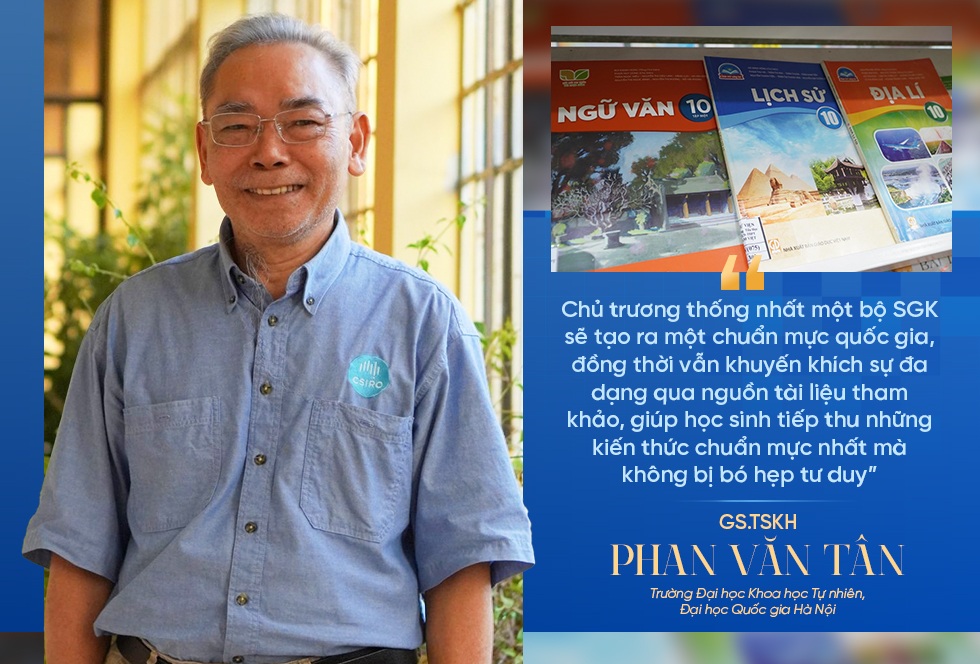
Experts share that Resolution 71-NQ/TW does not require a single set of textbooks, but rather a unified national set of textbooks. This approach inherits the spirit of the previous Resolutions 88/2014/QH13 and 51/2017/QH14.

Previous expectations about the diversity and creativity that the "one curriculum - multiple textbooks" model would bring have clashed with reality. Therefore, upon hearing the news that there would be a unified set of textbooks, teachers, parents, and students all expressed their joy.
Ms. Nguyen Mai Hoa (Xuan Phuong ward, Hanoi) vividly remembers the times she transferred her children to different schools. While the transfer went smoothly for her eldest child, who was studying the old curriculum, was very difficult when her second child, who was studying the new curriculum, transferred in the second semester of 6th grade.
This parent said: "The reason is that the two schools use different textbooks. I had to go to three different stores to gather enough books for my child. After that, it took my child a long time to review the material."
Therefore, Ms. Hoa hopes that the policy of unifying a single set of textbooks will put an end to the disparity in knowledge between schools, making it easier and more convenient for students to transition between grades and schools, while also reducing the burden of purchasing books and materials for families.
Sharing the same view, Nguyen Dan Sa, a student from Con Cuong High School in Nghe An province, pointed out that having multiple sets of textbooks has created unnecessary inconveniences. She said that at the beginning of the school year, they often lack "this book or that book," and the worst part is that if they lose a book in the middle of the year, it's very difficult to find replacements.
"In the past, sisters in the family used to receive hand-me-down textbooks from their older siblings. But in recent years, they're no longer usable because they're different everywhere," Sa explained.
The female student expressed her absolute support for a unified set of textbooks nationwide, as Dan Sa believes this would make exams, transferring schools, and buying books much easier.
She emphasized: "During the teaching and learning process, teachers and students will expand their exploration to other sources of information and references because, in reality, the content and data in textbooks are very small compared to the enormous amount of data that students need to access and research."
Ms. Hoang Thi Hoa, a chemistry teacher at Ha Dong High School in Hai Duong, also shared that over the past five years, teachers have faced more challenges working with multiple sets of textbooks simultaneously.
"Some textbooks write superficially, while others write meticulously, and vice versa. Therefore, if any content is mentioned in any of the three current textbooks, teachers have to expand on it. The pressure on teachers preparing students for final exams is immense, and students also have to study more," Ms. Hoa explained.
Therefore, when she heard the news that there would be a unified set of textbooks, Ms. Hoa was very happy. According to her, the scope of knowledge will not change, but the burden on teachers and students will be reduced.
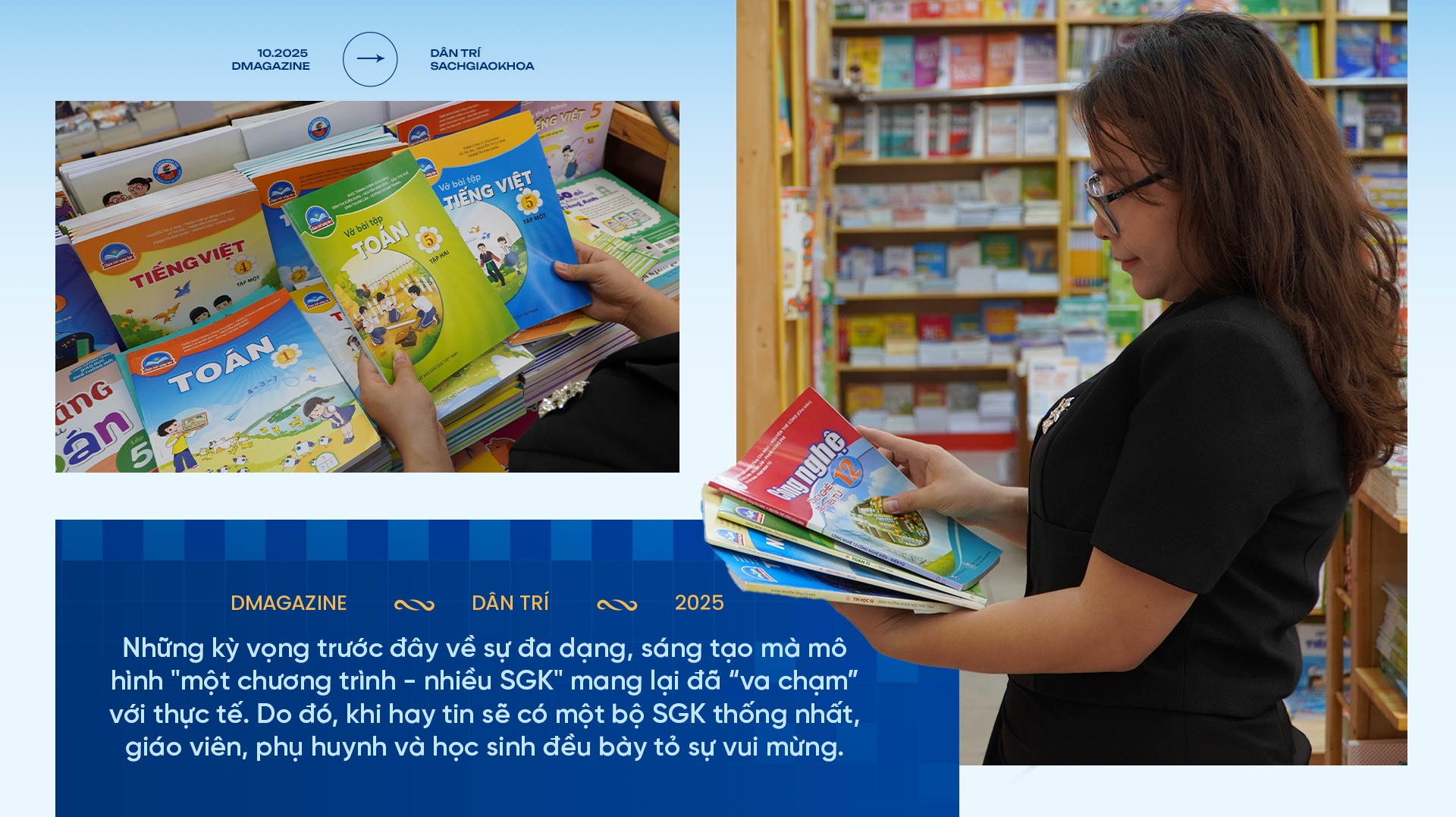
"A single set of textbooks will ensure consistency and uniformity in learning and testing across schools. Students transferring from one school to another won't have to worry about changing textbooks," shared a teacher from Ha Dong High School.
At the macro-level of management, this policy has received strong support from the National Assembly. During the discussion on the draft amendments to three laws on education on October 22nd, National Assembly representative Nguyen Huu Thong (Lam Dong delegation) emphasized that the State's unified issuance of a single set of textbooks for the entire country is in line with the Party's will and the people's aspirations, as well as being appropriate to current realities.
The delegates analyzed that the Party's intention here is to institutionalize Resolution 71 of the Politburo on the development of education and training and Resolution 88 of the National Assembly on reforming the curriculum and textbooks; while aligning with the people's will means fulfilling the aspirations of voters expressed in National Assembly sessions regarding textbooks.
Agreeing with this policy, National Assembly representative Ma Thi Thuy (Tuyen Quang delegation) shared that unifying textbooks will ensure fairness in access to education, especially for remote areas, ethnic minority regions, and mountainous areas – where economic conditions and infrastructure are limited.
In addition, delegates also agreed with the policy of providing free textbooks for students, considering it a humane policy. However, to ensure the policy is implemented effectively, delegate Ma Thi Thuy suggested that the Government needs to clarify the mechanism for managing and reusing textbooks, and also consider policies to encourage shared textbook libraries in schools to avoid wasting resources.

Dr. Nguyen Thi Mai Hoa, Vice Chair of the National Assembly's Committee on Culture and Society, viewed this policy with profound significance. When the State guarantees a common set of textbooks for the entire country, it is a way of caring for each student, ensuring that every child – regardless of their region – has access to knowledge on the same foundation.
According to her, this policy demonstrates the superiority of the regime, is in line with public sentiment, and meets the aspirations of a large number of parents and students.
From a social perspective and in the context of education in general, having a unified set of textbooks nationwide has significant implications.
Specifically, in terms of social significance, establishing a unified set of textbooks will help parents no longer worry about textbooks for their children when the new school year begins; it will alleviate concerns related to learning, exams, and assessments related to textbooks when children change schools...
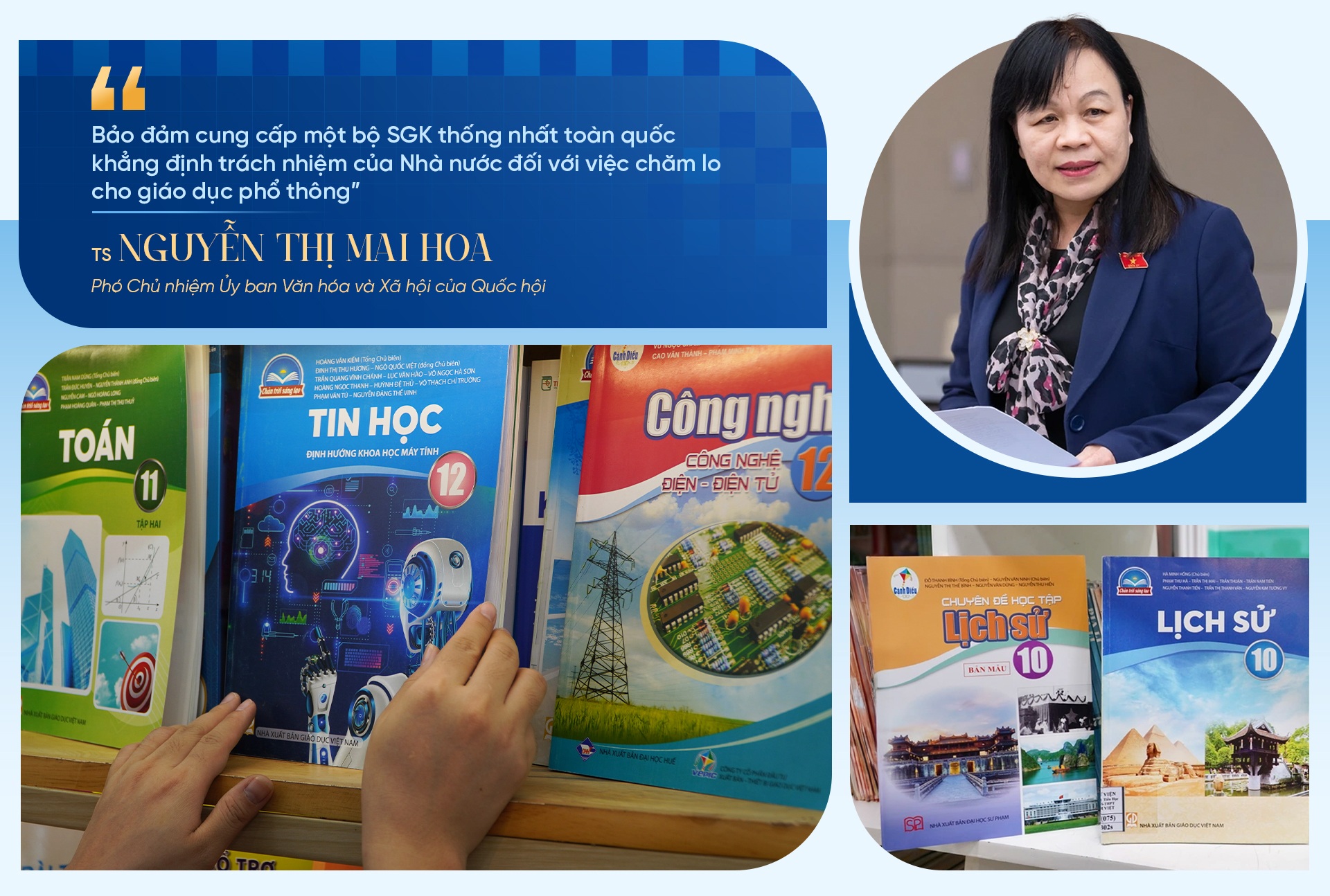
"This will certainly bring joy to the parents of the students, especially those from disadvantaged families with low incomes," Ms. Hoa shared.
From an educational perspective in general, establishing a unified national set of textbooks addresses shortcomings in the distribution and use of textbooks due to the textbook selection process; it also reduces the pressure in building a question bank for the high school graduation exam, ensuring appropriateness, objectivity, and fairness for students studying different sets of textbooks.
With the above implications, according to Dr. Nguyen Thi Mai Hoa, the National Assembly's Committee on Culture and Society consistently maintains the view that there should be a set of textbooks from the State, used uniformly nationwide. The policy of ensuring the provision of a unified set of textbooks nationwide affirms the State's responsibility in providing a high-quality, reasonably priced set of textbooks that are consistent in teaching and evaluating high school graduation results.
Source: https://dantri.com.vn/giao-duc/tu-lop-hoc-den-nghi-truong-dong-thuan-cho-mot-bo-sach-giao-khoa-thong-nhat-20251027214929541.htm







![[Photo] Prime Minister Pham Minh Chinh attends the Conference summarizing and implementing tasks of the judicial sector.](/_next/image?url=https%3A%2F%2Fvphoto.vietnam.vn%2Fthumb%2F1200x675%2Fvietnam%2Fresource%2FIMAGE%2F2025%2F12%2F13%2F1765616082148_dsc-5565-jpg.webp&w=3840&q=75)
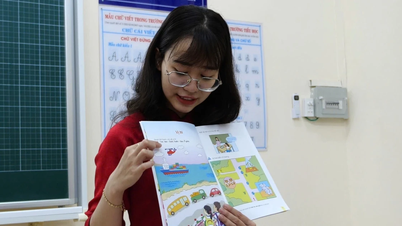

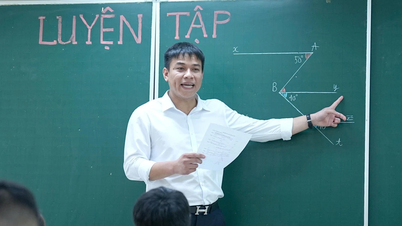
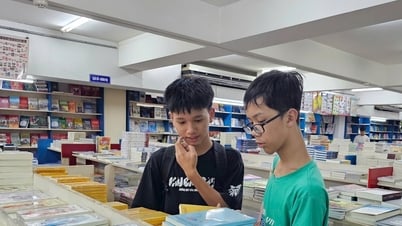

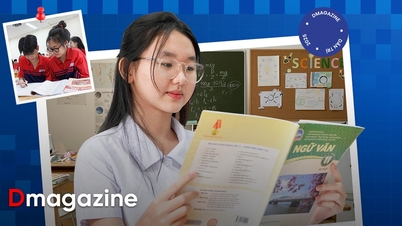
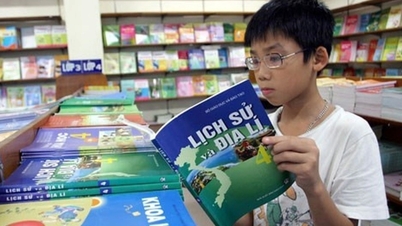
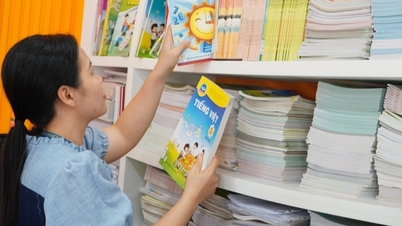
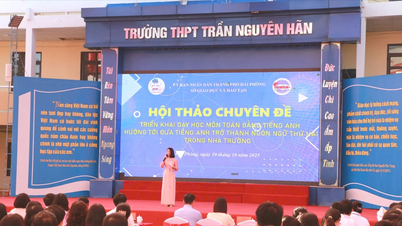

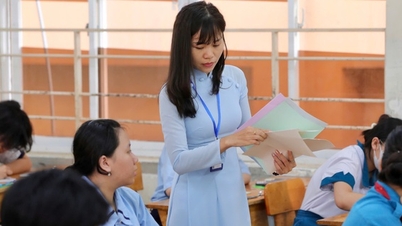

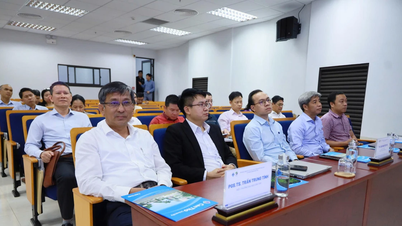
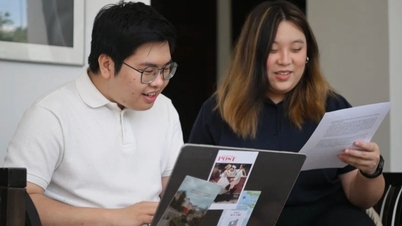
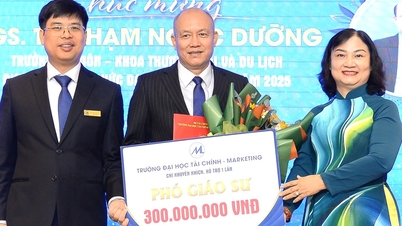

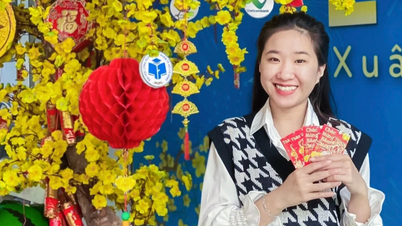







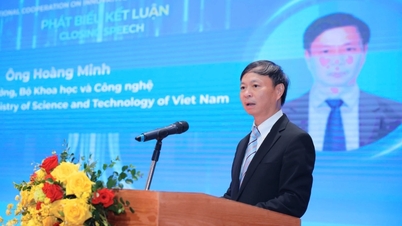









































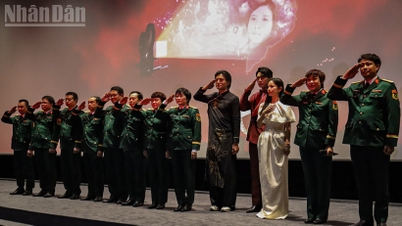




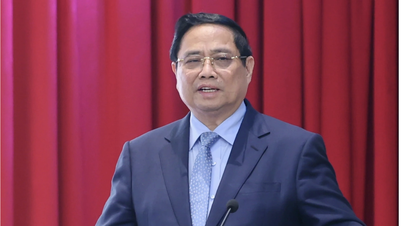



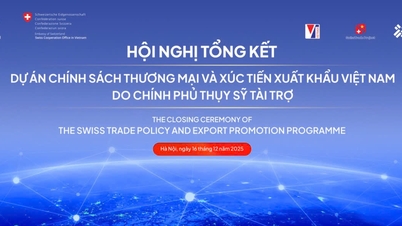

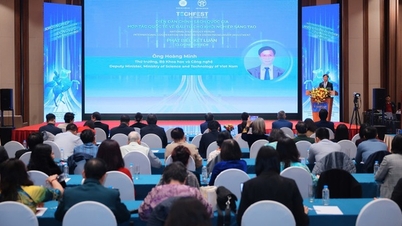

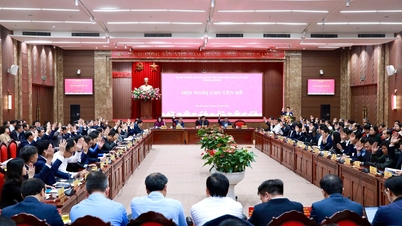

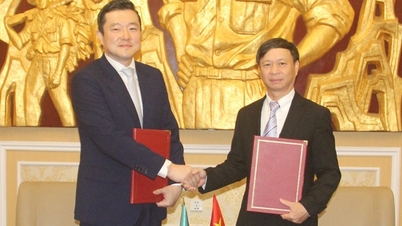


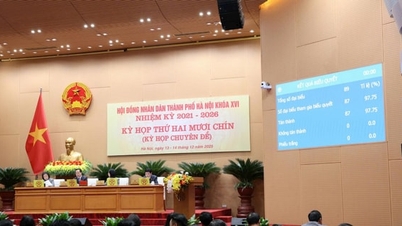

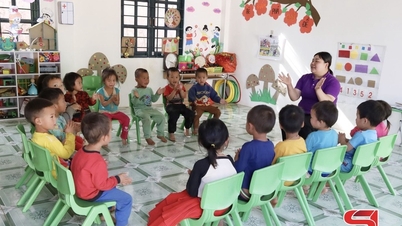





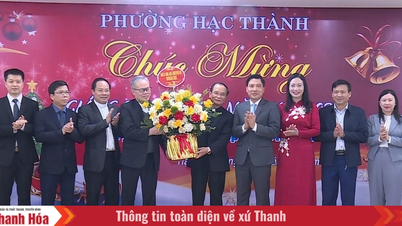














Comment (0)